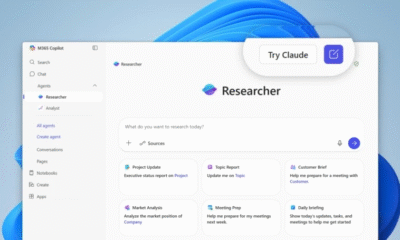AI
Ensuring Continuity: ACE’s Evolving Playbooks for Advancing Self-Improving AI Agents

The Significance of Agentic Context Engineering Framework in AI Development
A groundbreaking collaboration between Stanford University and SambaNova has introduced a novel framework called Agentic Context Engineering (ACE) to address a crucial obstacle in creating resilient AI agents: context engineering. This innovative approach automatically populates and adjusts the context window of large language model (LLM) applications by treating it as a dynamic playbook that evolves to refine strategies as the agent interacts with its environment.
ACE serves as a solution to the limitations faced by existing context-engineering frameworks, ensuring that the model’s context does not deteriorate as it accumulates more information. Experimental results demonstrate that ACE excels in optimizing system prompts and managing an agent’s memory, surpassing other methods in terms of effectiveness and efficiency.
The Role of Context Engineering in Advanced AI Applications
Advanced AI systems leveraging LLMs heavily rely on context adaptation, also known as context engineering, to steer their behavior. Instead of retraining or fine-tuning the model, developers leverage the in-context learning capabilities of LLMs to modify input prompts with specific instructions, reasoning steps, or domain-specific knowledge. Context engineering aims to organize new information in a manner that enhances the model’s performance and prevents confusion, becoming a central approach in constructing competent, scalable, and self-improving AI systems.
Context engineering offers multiple benefits for enterprise applications, such as interpretability for users and developers, real-time updates with new knowledge, and cross-model sharing. It capitalizes on advancements in hardware and software, such as the expanding context windows of LLMs and efficient inference techniques like prompt and context caching.
Challenges Addressed by Agentic Context Engineering
Automated context-engineering methods encounter two primary challenges. The first is “brevity bias,” where prompt optimization tends to prioritize concise, generic instructions over detailed ones, potentially diminishing performance in complex domains. The more critical issue is “context collapse,” where frequent rewriting of the entire context leads to information loss, akin to digital amnesia.
The researchers highlight the necessity for contexts to evolve as comprehensive, rich playbooks rather than succinct summaries. This strategy aligns with the capabilities of modern LLMs to distill relevance from detailed contexts effectively.
Functionality of Agentic Context Engineering (ACE)
ACE serves as a comprehensive context adaptation framework for both offline tasks like system prompt optimization and online scenarios involving real-time memory updates for agents. Instead of compressing information, ACE treats the context as a dynamic playbook that accumulates and organizes strategies over time.
The framework operates through three specialized roles: Generator, Reflector, and Curator. This modular design draws inspiration from human learning processes, facilitating experimentation, reflection, and consolidation without overwhelming a single model with all responsibilities.
Implementation of ACE in AI Applications
Evaluation of ACE on tasks requiring multi-turn reasoning and specialized knowledge showcases its superiority over existing methods, delivering performance gains in offline and online settings. Notably, ACE enables effective context building by analyzing feedback from actions and the environment, eliminating the need for manually labeled data.
ACE’s efficiency is underscored by its ability to adapt to new tasks with significantly lower latency than conventional methods, emphasizing the feasibility of scalable self-improvement with enhanced accuracy and reduced overhead.
Future Prospects of Agentic Context Engineering
ACE lays the foundation for dynamic, continuously improving AI systems. By allowing domain experts to shape AI knowledge through context editing, governance becomes more practical and transparent. The framework’s efficiency and adaptability demonstrate that enterprises can achieve top-tier results without relying on massive proprietary models, fostering innovation and competitiveness.
-

 Facebook3 days ago
Facebook3 days agoWarning: Facebook Creators Face Monetization Loss for Stealing and Reposting Videos
-

 Facebook4 days ago
Facebook4 days agoInstaDub: Meta’s AI Translation Tool for Instagram Videos
-

 Video Games4 days ago
Video Games4 days agoGoku Takes on the Dragon Ball FighterZ Arena
-

 Facebook3 days ago
Facebook3 days agoFacebook Compliance: ICE-tracking Page Removed After US Government Intervention
-

 Video Games5 days ago
Video Games5 days agoTekken 8: Rise of the Shadows
-

 Microsoft3 days ago
Microsoft3 days agoMicrosoft Integrates Anthropic’s Claude AI Models into 365 Copilot: A Deepening Relationship with OpenAI
-

 Cars3 days ago
Cars3 days agoRevving into the Future: Ferrari’s Plan to Unleash 20 New Models, Including Electric Vehicles, by 2030
-

 Amazon5 days ago
Amazon5 days agoNeil Young Takes a Stand: Pulling Music from Amazon in Protest of Jeff Bezos’ Support for Trump































